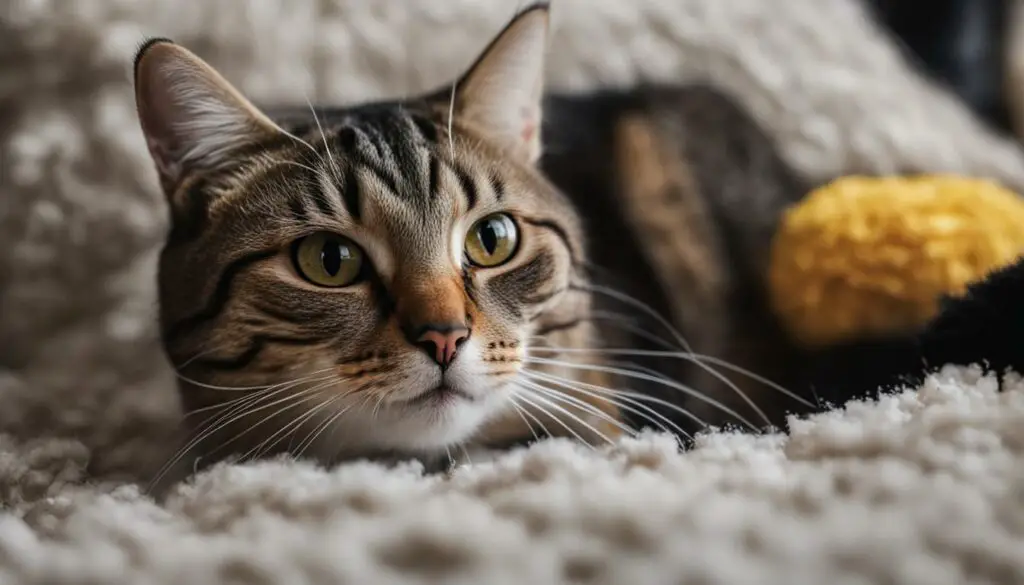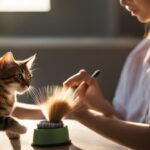Greetings! As a proud cat owner, I’ve often found myself scratching my head (pardon the pun) when trying to understand the peculiar behavior of my feline companion. One puzzling phenomenon that many of us encounter is the inexplicable urge our cats have to lick our pillows. Trust me, it’s not just you!
Today, we’re going to dive into the fascinating world of cat behavior, shedding light on why our furry friends partake in such delightful antics. From understanding the reasons behind their pillow-licking tendencies to exploring other bed sheet-related behaviors like scratching and their fascination with dryer sheets, we’ll uncover the secrets behind these quintessential feline behaviors. So, grab a cup of tea and let’s unravel this delightful mystery together!
Key Takeaways:
- Cats may lick pillows as a way to bond with their owners or mark their territory.
- Excessive licking could indicate stress or anxiety in cats.
- Pica behavior, where cats ingest non-food items, may be a cause of pillow licking and should be addressed.
- Scratching bed sheets is a way for cats to mark their territory and exercise their muscles.
- Redirecting scratching behavior with appropriate alternatives, like scratching posts, can protect your sheets.
Reasons Behind Your Cat Licking Your Bed Sheets
Cats have a peculiar habit of licking bed sheets, and there are several reasons why they engage in this behavior. Understanding these reasons can help pet owners address this habit effectively and provide a suitable environment for their feline companions.
Territorial Behavior and Bonding
One possible explanation for cats licking bed sheets is that they are territorial creatures. Licking the sheets can be a way for them to mark their territory and establish a bond with their owners. By leaving their scent on the sheets, cats feel a sense of familiarity and security. It’s their way of claiming the bed as their own and showing affection towards their human companions.
Stress and Anxiety
Another reason for excessive licking behavior in cats is stress or anxiety. When cats feel overwhelmed or anxious, they may resort to licking as a coping mechanism. It provides them with comfort and helps them relieve tension. If your cat is displaying excessive licking behavior, it might be worth considering if there are any stressors in their environment or changes that might be causing them anxiety. Creating a calm and soothing atmosphere can help reduce their need for excessive licking.
Pica Behavior
Pica behavior, which is the ingestion of non-food items, can also be a reason why cats lick bed sheets. It can indicate an underlying medical problem or behavioral issue. Some cats may be compelled to lick and ingest fabrics due to nutritional deficiencies, gastrointestinal issues, or boredom. It’s important to consult with a veterinarian if you suspect that your cat’s licking behavior is related to pica to rule out any potential health concerns.
| Reason | Explanation |
|---|---|
| Territorial Behavior | Cats lick bed sheets to mark their territory and bond with their owners. |
| Stress and Anxiety | Excessive licking can be a response to stress or anxiety in cats. |
| Pica Behavior | Licking bed sheets may indicate a medical problem or behavioral issue, such as pica behavior. |
Understanding the reasons behind your cat’s licking behavior is the first step in addressing it effectively. By providing a calm and stress-free environment, engaging in regular play sessions, and consulting with a veterinarian if necessary, you can help redirect your cat’s attention and create a harmonious living space for both you and your feline friend.
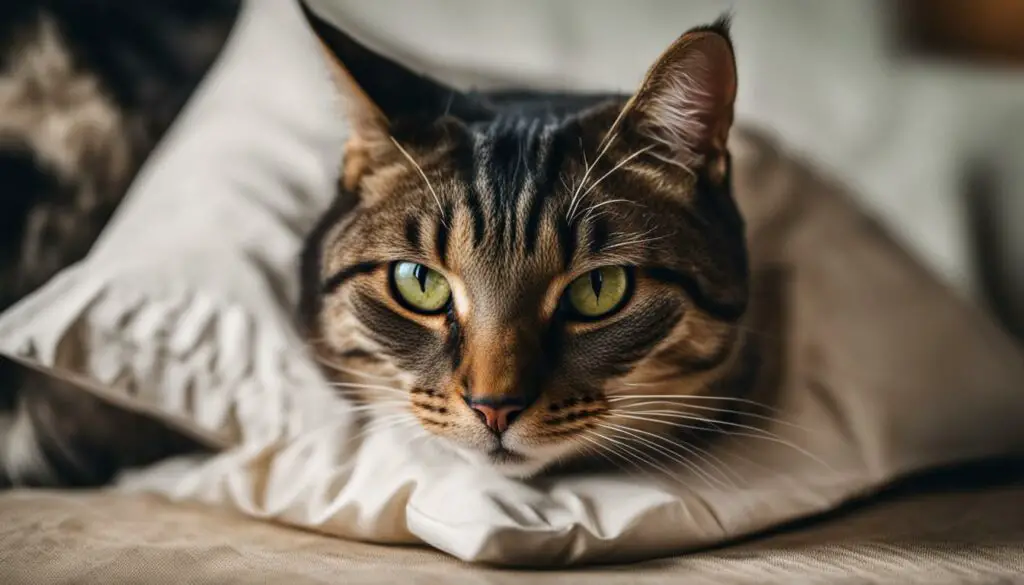
Why Does My Cat Scratch My Bed Sheets?
Understanding why cats scratch bed sheets can help pet owners address this behavior effectively. There are several reasons why cats engage in this behavior:
- Territorial marking: Cats have scent glands in their paws, and scratching their bed sheets can help them mark their territory and leave their scent behind.
- Exercise and stretching: Scratching is a natural instinct for cats, and it helps them exercise their muscles and maintain their claws.
- Stress relief: Cats may scratch bed sheets as a way to relieve stress or frustration. It provides them with an outlet for their emotions.
To redirect your cat’s attention from scratching bed sheets, providing suitable alternatives is key. Consider getting a scratching post or pad and placing it near the bed. Encourage your cat to use the alternative by using catnip or treats as incentives. Additionally, make the bed sheets less attractive to your cat by using double-sided tape or aluminum foil on the edges. This can deter them from scratching and redirect their attention to the appropriate scratching area.
Table: Alternate Scratching Options for Cats
| Scratching Option | Description |
|---|---|
| Scratching Post | Tall, sturdy post covered with sisal or carpet material, providing an appropriate surface for scratching. |
| Scratching Pad | Flat pad made of corrugated cardboard or sisal rope, offering a different texture for scratching. |
| Vertical Scratcher | Wall-mounted scratcher that allows cats to stretch and scratch vertically. |
| Horizontal Scratcher | Low-profile scratcher designed for cats to scratch horizontally, simulating the motion of scratching bed sheets. |
Remember to praise and reward your cat when they use the appropriate scratching area and avoid punishing or scolding them for scratching the bed sheets. Positive reinforcement is key to redirecting their behavior effectively.
Why Does My Cat Like Dryer Sheets?
Cats’ fascination with dryer sheets is a common and intriguing behavior that many pet owners have observed. There are a few reasons why cats are attracted to these seemingly mundane household items.
Firstly, the crinkly sound that dryer sheets make can mimic the sound of prey, triggering cats’ predatory instincts. The rustling noise can catch their attention and pique their curiosity. It’s similar to how cats are drawn to the sound of a toy being dragged across the floor or a bird chirping outside the window. Their natural instinct to hunt and capture prey is activated by these sounds, and they become captivated by the dryer sheets.
Secondly, dryer sheets often have scents that can be appealing to cats. Cats have a highly developed sense of smell, and certain fragrances can stimulate their senses. The aromatic scents on dryer sheets may be intriguing or pleasant to cats, making them want to investigate and interact with the sheets.
However, it’s important to note that while cats may enjoy playing with or being around dryer sheets, these items can be potentially harmful if ingested. Dryer sheets contain chemicals that are not safe for cats to consume. Therefore, it’s crucial to keep dryer sheets out of your cat’s reach and provide safe alternatives that can stimulate their senses without posing any health risks.
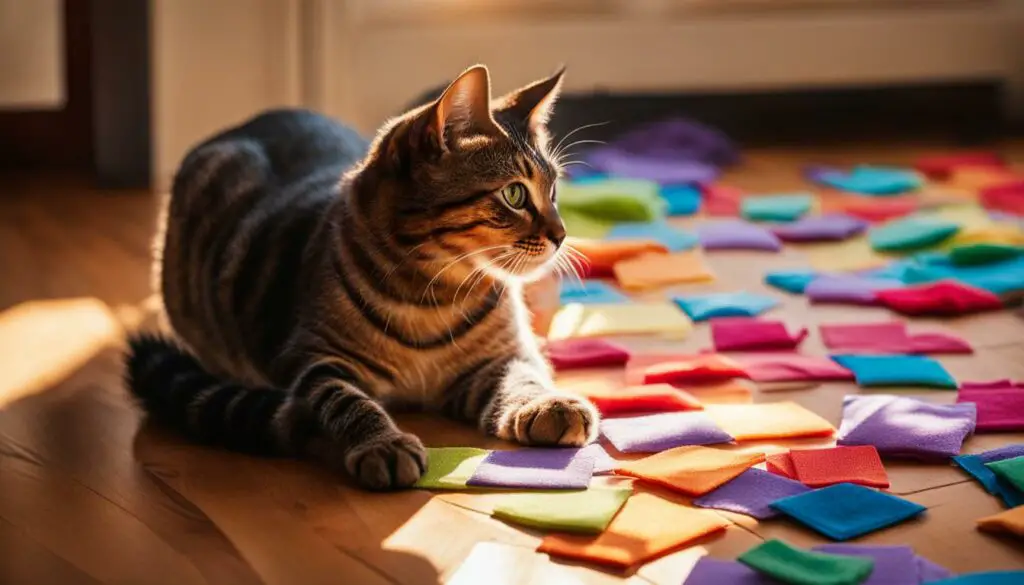
Alternatives to Satisfy Your Cat’s Fascination
If your cat is drawn to dryer sheets, there are a few alternatives you can provide to redirect their attention. One option is to offer interactive toys that mimic the crinkly sound of dryer sheets, such as crinkly balls or toys with hidden treats that make noise when played with. These toys can satisfy your cat’s desire for auditory stimulation while keeping them safe.
Another alternative is to provide your cat with a designated play area that includes fabric or blanket toys. By giving them their own soft materials to knead, lick, and scratch, you can redirect their fascination away from your laundry and onto items that are safe and cat-friendly. Be sure to choose fabrics that are free from any potentially harmful chemicals and always supervise your cat during playtime.
In summary, cats’ fascination with dryer sheets can be attributed to the crinkly sound they make, which triggers their prey instincts, and the appealing scents they often contain. Although this behavior is intriguing, it’s important to prioritize your cat’s safety by keeping dryer sheets out of their reach and providing suitable alternatives. Redirecting their attention with interactive toys and safe fabric toys can help satisfy their fascination while ensuring their well-being.
How to Redirect Your Cat’s Attention
If your cat’s licking or scratching behavior becomes problematic, there are several strategies you can try to redirect their attention and prevent further damage to your bed sheets. Here are some effective cat behavior solutions:
Create a Distraction
Engaging your cat in active play sessions using toys that cater to their hunting instincts can help redirect their behavior. Interactive toys such as feather wands, laser pointers, or puzzle toys can keep your cat entertained and mentally stimulated. By providing a fun and engaging alternative, you can redirect their attention away from your bed sheets.
Provide Suitable Alternatives
Offering your cat their own fabric or blanket that they can lick, scratch, or knead can help redirect their behavior. Providing a designated scratching post or pad near their favorite sleeping spot can also help deter them from scratching your bed sheets. Make sure to choose appropriate materials that mimic the texture of your bed sheets to encourage your cat to use their designated area instead.
Create a Calm Environment
Cats may engage in excessive licking or scratching when they are stressed or anxious. To minimize these behaviors, create a stress-free environment by using pheromone diffusers, providing safe hideaways such as cat trees or cozy beds, and maintaining a consistent routine. Cats thrive in a calm and predictable environment, and reducing stressors can help alleviate unwanted behaviors.
If these strategies don’t work or if you’re facing more severe behavioral issues, it’s advisable to seek advice from a veterinarian or professional pet behaviorist. They can provide personalized guidance and recommend additional techniques to address your cat’s specific needs.
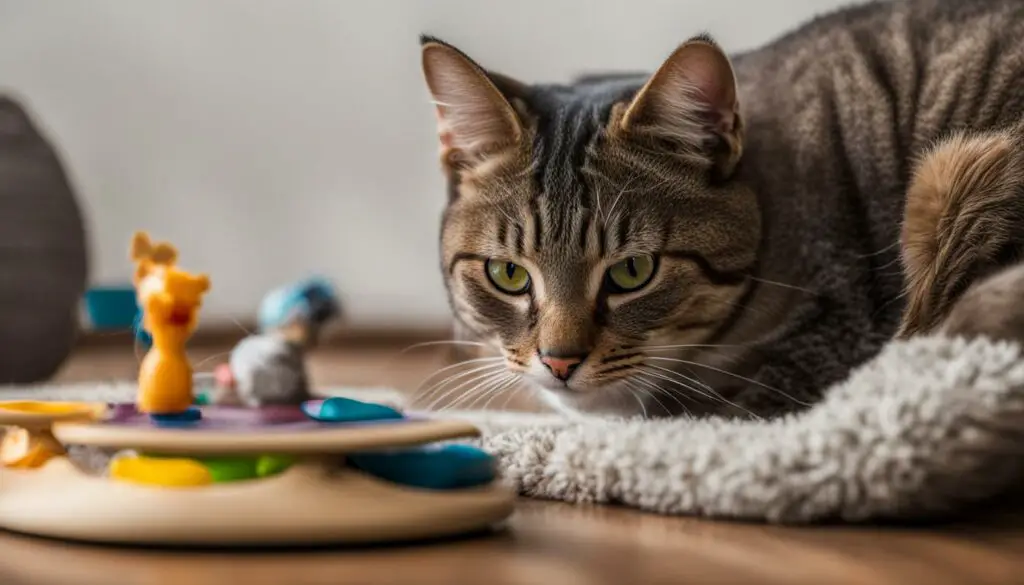
| Redirect Cat’s Attention Techniques | Effectiveness |
|---|---|
| Engage in active play sessions | Highly effective |
| Provide suitable alternatives | Moderately effective |
| Create a calm environment | Moderately effective |
| Seek professional advice | Recommended for severe issues |
Conclusion
Understanding cat behavior, especially the reasons behind their licking and scratching of bed sheets, can be a fascinating journey for pet owners. By delving into the motivations behind these quirky habits, we can forge stronger bonds with our feline friends and provide them with the care they need.
When it comes to redirecting your cat’s attention away from your bed sheets, there are a few helpful tips to keep in mind. Engaging your cat in interactive play sessions with toys that mimic their hunting instincts can provide a productive outlet for their energy. Offering them their own fabric or blanket to lick, scratch, or knead can satisfy their natural desires without damaging your bedding.
Creating a stress-free environment for your cat is also essential. Utilizing pheromone diffusers, creating safe hideaways, and maintaining a consistent routine can go a long way in reducing anxiety and unwanted behaviors. And remember, if you’re struggling to address these issues, seeking guidance from a veterinarian or professional pet behaviorist can provide valuable insights and tailored solutions.
In the end, it’s all about providing a safe, healthy, and engaging environment for our beloved cats. By understanding their behavior and implementing appropriate strategies, we can ensure our furry friends lead happy and fulfilling lives alongside us.
FAQ
Why does my cat lick my bed sheets?
Cats may lick bed sheets for various reasons, such as marking their territory, seeking comfort, or displaying signs of stress or anxiety.
How can I stop my cat from scratching my bed sheets?
Providing appropriate scratching alternatives, such as scratching posts or pads, can help redirect your cat’s scratching behavior away from your bed sheets.
Why does my cat like dryer sheets?
Cats may be attracted to the crinkly sound and scents of dryer sheets, which can trigger their predatory instincts. However, it’s important to keep dryer sheets out of your cat’s reach as they can be harmful if ingested.
How can I redirect my cat’s attention away from my bed sheets?
Engaging your cat in active play sessions, providing them with their own fabric or blanket to scratch or knead, and creating a stress-free environment can help redirect their attention away from your bed sheets.
What should I do if my cat’s licking or scratching behavior becomes a problem?
If your cat’s behavior becomes problematic, it’s recommended to try redirection techniques first. If these don’t work, seeking advice from a veterinarian or professional pet behaviorist may be beneficial.

